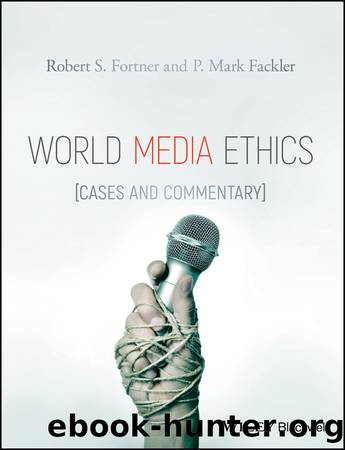World Media Ethics by Robert S. Fortner P. Mark Fackler

Author:Robert S. Fortner,P. Mark Fackler [Fackler, P. Mark]
Language: eng
Format: epub
ISBN: 9781118990001
Publisher: John Wiley & Sons, Inc.
Published: 2016-10-31T00:00:00+00:00
The philosophy of this new form of democracy is “that those living in market-based societies should not expect the kind of social justice or equity in the marketplace that socialists and liberal progressives demand. The argument instead is that this should not be expected of market-based societies. Instead, the capitalist marketplace – as the preeminent rationalized articulation of the modern human condition – is designed to allow the entrepreneurially astute individuals to successfully achieve security, prosperity, and profit, while those less capable in this context fall behind and must take responsibility on themselves to improve their condition” (Ibid., p. 44). The result for people in the United States: “substantial levels of social exclusion, including high levels of income inequality, high relative and absolute poverty rates, poor and unequal outcomes, poor health outcomes, and high rates of crime and incarceration” (Schmitt and Ben Zipperer, 2006, quoted by Rosow and George, 2015, p. 50).
The United States, as the country currently with the largest gross domestic product on the planet, exports this philosophy to other countries, including nascent democracies that often restrict participation in non-economic ways for the political purposes of their own prevailing elites. This occurs through the demands made by the World Bank, the InterAmerican and other development banks, the International Monetary Fund, and in Europe, the European Union and the Eurozone (promoted primarily by Germany as the continent's largest economy). So, when countries' economies falter and they seek assistance from such transnational organizations, it is their demands that determine levels of public spending, investments in infrastructure, education, health and welfare services – not the will of the people themselves whose active participation in democratic fora might otherwise be solicited by their political representatives. This not only strains the resources of civil society, but makes its objections on behalf of social justice or moral commitment largely irrelevant. This is then what Robert Dahl calls managed democracy, or polyarchy:
Put simply, polyarchy refers to a system in which a small group actually rules, and mass participation in decision making is confined to leadership choice in elections managed by competing elites. It is, in this sense, rule by an elite with “democratic” characteristics, in which democratic participation is limited to the electoral process and the simple act of choosing between elites every few years. More significantly, the polyarchic notion of democracy does not acknowledge the significance of economic equality as integral to democracy.
(Rosow and George, 2015, p. 53)
Download
This site does not store any files on its server. We only index and link to content provided by other sites. Please contact the content providers to delete copyright contents if any and email us, we'll remove relevant links or contents immediately.
| Advertising | Consumer Behavior |
| Customer Service | Marketing |
| Public Relations | Sales & Selling |
| Search Engine Optimization |
Influence: The Psychology of Persuasion by Robert B. Cialdini(4796)
The Miracle Morning by Hal Elrod(4727)
The Hacking of the American Mind by Robert H. Lustig(4383)
Pre-Suasion: A Revolutionary Way to Influence and Persuade by Robert Cialdini(4232)
Unlabel: Selling You Without Selling Out by Marc Ecko(3663)
Ogilvy on Advertising by David Ogilvy(3622)
Hidden Persuasion: 33 psychological influence techniques in advertising by Marc Andrews & Matthijs van Leeuwen & Rick van Baaren(3565)
Purple Cow by Seth Godin(3203)
Who Can You Trust? by Rachel Botsman(3133)
Kick Ass in College: Highest Rated "How to Study in College" Book | 77 Ninja Study Skills Tips and Career Strategies | Motivational for College Students: A Guerrilla Guide to College Success by Fox Gunnar(3129)
The Marketing Plan Handbook: Develop Big-Picture Marketing Plans for Pennies on the Dollar by Robert W. Bly(3062)
This Is Marketing by Seth Godin(3038)
I Live in the Future & Here's How It Works by Nick Bilton(2997)
The Power of Broke by Daymond John(2988)
The Tipping Point by Malcolm Gladwell(2922)
Building a StoryBrand by Donald Miller(2915)
The 46 Rules of Genius: An Innovator's Guide to Creativity (Voices That Matter) by Marty Neumeier(2855)
Draw to Win: A Crash Course on How to Lead, Sell, and Innovate With Your Visual Mind by Dan Roam(2784)
Market Wizards by Jack D. Schwager(2700)
